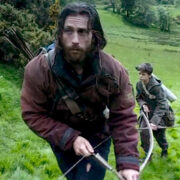The Devastating Beauty Of JOJO RABBIT
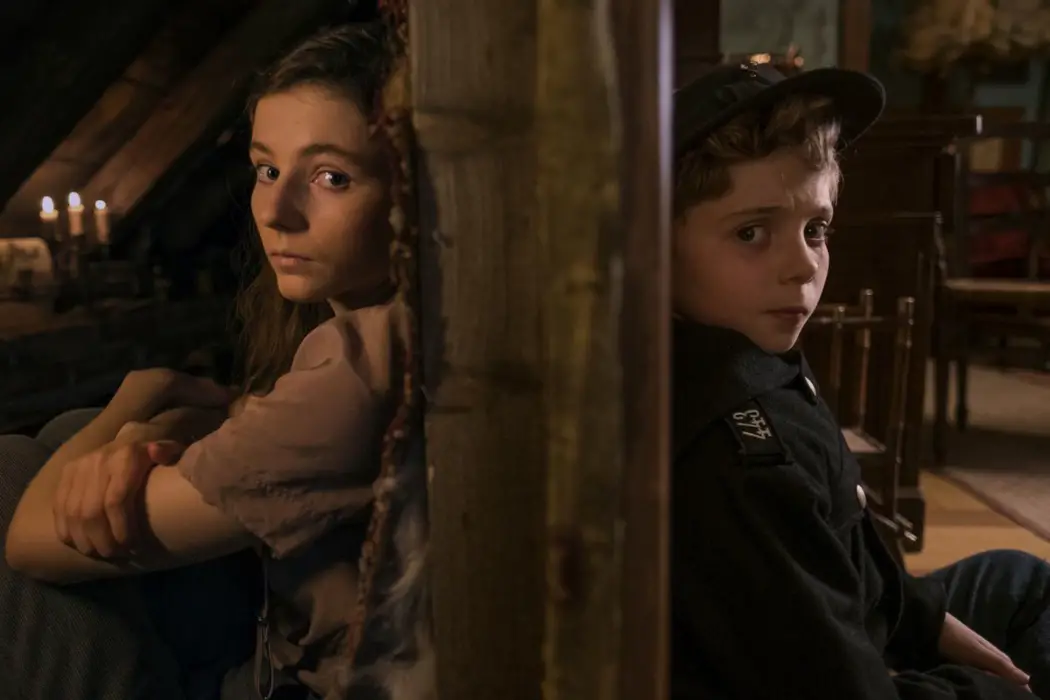
Stephanie Archer is 39 year old film fanatic living in…
Warning: spoilers ahead.
There is a beauty in those things that appear to us as innocent, yet find they are just masks, covering the dark truth beneath. Disney has made a fortune doing this, adult themes hidden within the context of dialogue and nonverbal communication. Though it is not only children’s films that present humor even in the darkest of situations, carefully crafting dark themes just below the surface.
JoJo Rabbit, from writer, director and star Taika Waititi, is the most recent to join the ranks, not a film for the young at heart but instead about it. Through the eyes of a child’s innocence, viewers are given a diaphanous veil to the darkness of war, brain washing and the hate that created and accelerated a war and a genocide. The seeds planted deeply into the perspective of a child, too naive to understand and too willing to follow, all while the world around him fell to devastation – a world that was more than what it seemed.
One Foot Forward
Watching Jojo Rabbit, I found myself calling back to the theory of Checkov’s Gun, wherein if something is introduced in the beginning (a gun) it must be used by the end of the film. This proved to be true with regards to Jojo’s mother, where in the close-up introduction of a shoe proved to be more important that viewers could have ever predicted.
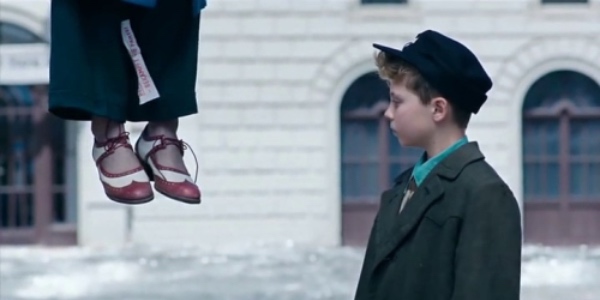
Originally introduced as Rosie (Scarlett Johansson) walked along the side of the pool her son was stationed at, I had been wanting the entire film to see where this close-up of her shoes would lead. I had no idea the depth it would hold. It wasn’t until the impact of Jojo (Roman Griffin Davis) turning a corner, walking right into them, until I was able to understand fully, to take in the devastating and effective meaning. In this moment, with them hanging above the ground, the camera fixed on Jojo, her shoes and the shoes of those hanging beside her, I am instantly brought back to photographs that have found lasting effect since the conclusion of the war. In this moment, an entire genocide is captured.
As Jews were loaded into the trains to be transported to concentration camps, all of their belongings were confiscated from them. Where suitcases were ripped open, clothes, jewelry and photos thrown to the ground, so too were the shoes ripped from their feet. Photographs of the time depict mounds of footwear, each lost in a sea of mismatched pairs, each a lasting indication of the lives lost.
Shoes have a history of canonizing moments in history, many times as a result of devastating moments. When the remains of the Titanic were discovered, the only evidence of the bodies that were lost to the sea were a pair of boots resting on the ocean floor. Lack of proper footwear in war have brought down armies, giving them the severe disadvantage against their opponents. For World War II, shoes are the pieces that stayed behind, evidence of those lost to history, that they did once exist. They are a testament to the thousands who fell victim to the genocide and to hate.
Yet, where the mother’s shoes are a literal representation of the imagery of World War II, their meaning is so much more.
A Faceless War
Where the shoes represent a horrific imagery captured from the war, they are also a representation not only of the lives lost, but the ones that will forever remain faceless throughout history. So many lives were taken, there photos, heirlooms, and tactile memories robbed, discarded as if nothing more than trash. As many fell to hate and genocide, shoes were only one of the many images and items that could account for those lost – or at least try.
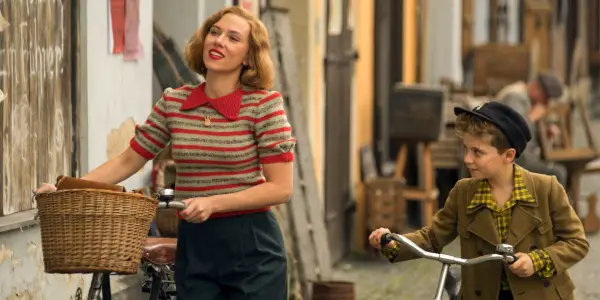
As the victims hang in the gallows of the town in Jojo Rabbit, hoods covering their faces, we do not know who they are or their crimes. They, like many throughout the war, are faceless, nameless – lost to history and to time. As Rosie’s body hangs there too, Jojo is only able to know her by the shoes that she wears. While many have been remembered for the heroism, sacrifice and incomprehensible violence allotted to them, there are far reaching numbers of those who will never be identified, never be known to their families.
She is left identifiable to make a larger statement and for cinematic effect but where we can tell it is Rosie, our ability to identify her speaks to another horror of war.
War Does Not Discriminate
When we look at any war that has befallen the world, countries or a nation, one of the most understood aspects is that no one is safe. While discriminatory on the surface, war does not truly discriminate. No matter the color of your skin, your financial status, gender or your political standing, no one is immune from the effects of war. They can be mild or severe, but no matter who you are, the effects of war will come for you.
With the mother’s shoes, there is an immediate understanding of her financial status within the town. She is well regarded and minded. Even as her body hangs beside others who have betrayed the country or have been deemed worthy of death, her shoes far outrank the others in quality and style. Clearly a member of the upper class, her status did not provide her any immunity. When her crimes against her country were discovered, there was no amount of money that could buy her salvation, no claim of life to protect her child – no negotiations. Jojo is not even allowed the courtesy of information, rather making the gruesome discovery on his own – just before the Gestapo arrive at his door to see the home Rosie once inhabited and ran.
Hiding Oneself to Survive
When Captain Klenzendorf is first introduced, Sam Rockwell’s character immediately strikes the viewer as below average for a Nazi. He is running Hitler’s youth camp away from the war, unkept and questionable in his methods and an alcoholic. Gone is the extreme devotion and loyalty to his leader and country, a wavering compliance to what is required of him. Absent too is the fierce hostility that commonly accompanies depictions of war time Nazis. For a good portion of the beginning of Jojo Rabbit, I was confused by this depiction and its meaning to the film, settling on the fact that his behaviors came from being removed from combat and coping poorly with it. Though as Jojo Rabbit continued, I discovered his character was one of the most important depictions of individuals during the war.
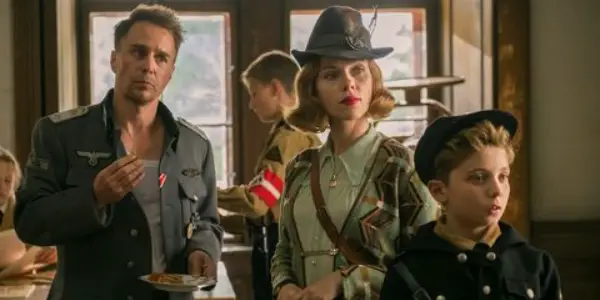
What slowly begins to reveal itself is that he is NOT a Nazi by choice, but rather one through desperation. While it can not be ignored there is a loyalty that lingers, devotion to a country is hard to break, there is a sad realization that Captain Klenzendorf is gay, hiding for his life in the ranks of the Nazis, his partner Finkel (Alfie Allen) by his side and his flask to cope. Discovery would mean eminent death, so the only answer he saw was to assimilate.
As he is forced to follow through with his decision to hide to survive, his loyalties to the Nazi party are what lead him to drink, the show of such careless disregard for the ambitious Nazi youth and the War itself. As he begins to design his attire and approach the final acts of his decisions, the pain only becomes more apparent, yet his means of coping more eccentric and memorable – yes I am referring to the glamorous Nazi attire he sported as the Allies brought defeat to his town and his army.
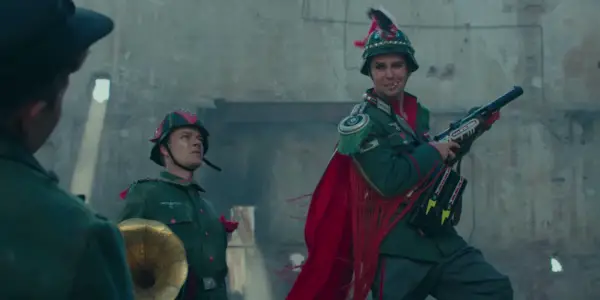
I have been asked why he let Elsa (Thomasin McKenzie) who had been hiding in the attic go? Why did he not turn her in as she was clearly incorrect in the identifying information given? He lets her go because he understands why she is hiding and the risks of her discovery, because he is hiding himself.
Coming of Age Beyond Fiction
We are far from a shortage of coming-of-age films throughout the entertainment industry. There is a fascination with the teenage mind, each generation creating a new plethora of entertainment, insight, and in some cases, nostalgia. Jojo Rabbit, in the stark reality of war and devastation, delivers its own coming-of-age-story, centering on the growth of Jojo. Where he starts the film as a small boy, influenced by the common belief and emulating his great leader as his personal imaginary friend, Jojo is a small boy far from growing up.
He does as he is told, believes what he is told to believe and meets both with a fierce loyalty and dedication. Like most children, when they are young, they are limited in their exposure to thoughts, ideas and free thinking. While encouraged, there is a limitation. If they grow up in a home strictly democratic or republican, progressive or non progressive – the child will typically begin their steps in the world shaped by this. They will accept this as the way the world is and should be. Yet, as a child begins to grow, their influences, experiences and knowledge changes with them. Individuality begins to take shape, changing the view of the world and others.
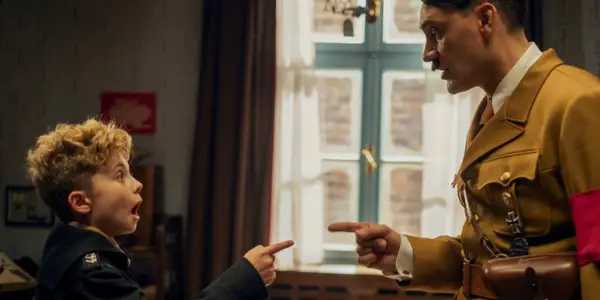
Jojo Rabbit gives great depth and pace to Jojo’s growth and expansion. Where his devote loyalty was unquestioned, his conversations with Elsa, the subtle hints from his mother, her loss and his experience with violence each give him the power to formulate his own thoughts, his own view of the world. While war is an extreme setting, it is an appropriate example of the environments children are born into and raised, and the world they will still have yet to enter and entertain. While war may not be an issue surrounding today’s children, they too have their own opinions to shape as they grow on topics that will change the world – and their own paths and interactions in life to follow.
Conclusion: A Satire to Deliver the Hardest Truths
Jojo Rabbit is a movie that delivers on its promise of humor and satire, yet when the film has ended, it does not leave viewers with jokes to regale to their friends or other film fanatics. Rather, it leaves a thought provoking imagery that speaks to the true prowess of the message behind the satire. Sometimes, the only way to effectively speak to an audience is through humor. Though do not let it fool you here, there is more than what meets the eye.
Does content like this matter to you?
Become a Member and support film journalism. Unlock access to all of Film Inquiry`s great articles. Join a community of like-minded readers who are passionate about cinema - get access to our private members Network, give back to independent filmmakers, and more.












